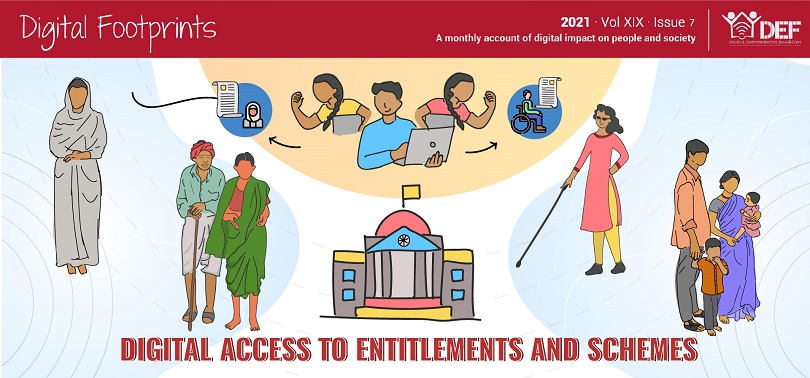

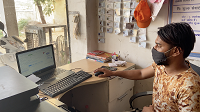
The central and state governments have put in place many such schemes to uplift the underprivileged, however, people in rural areas are unable to access what is entitled to them. There is lack of awareness about government schemes, improper information around the schemes and more than anything else the biggest challenge is applying for these schemes. Last mile reach and connectivity is a major issue in India with so many remote locations and so is the case with the government run entitlements. Read More






This year’s annual community network exchange was organised on 15th,17th and 21st November online with a specific focus on Community Networks for Social Good. Community Networks is the use of networking technologies by, and for, local communities providing a sustainable solution to address the connectivity gaps that exist in underserved urban, remote, and rural areas around the world. The event was attended by several experts, practitioners and policy makers across Asia Pacific region, to share their experiences, knowledge and build a path towards a better community network. First day started with setting the context discussing about the challenges faced and the opportunities that lie ahead, especially after the pandemic. Read More
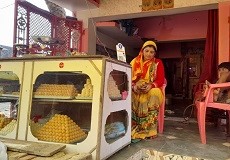
Rajkumari Gupta is a woman entrepreneur from Kotwa Dham, Barabanki, in Uttar Pradesh. She has been running a sweet shop for the past seven years. Being close to a famous temple, her business was mostly dependent on the devotees visiting the temple. During the lockdown her business came to a complete stop and while others in the market area were able to survive. Understanding the need to explore more ways to make her business more sustainable circumstances proof she met the DEF’s digital team. There she learned to use digital tools to market her business and reach to more customers in her village. Today she uses Google by using the Google Voice assistant. Read More

Antama Soni is a woman entrepreneur and resident of Kumbhraj, Guna in Madhya Pradesh and runs a beauty parlor. Before getting trained in digital tools, she used her smartphone only to make calls and take pictures of the customers but never showed it anywhere. After completing one of the digital upskilling training initiatives of DEF, she added to her knowledge on how to harness the digital tools to expand her business. Creating Facebook page to build a portfolio showcasing the new hairstyle and trends helped Antama to win confidence of the customers. Antama is now very active on WhatsApp, Facebook and Instagram and women in her community rely on her for their style and makeup.

Seema is a woman entrepreneur from Akbarpur, Barabanki, in Uttar Pradesh. She financially supports her family by darning clothes of the local community women, but the stitching clothes went to other women in her community. With a hope to harness her skills and get proper stitching work she joined Digital Sarthak training program. Digital Sarthak is a program to up-skill women entrepreneurs by building their digital capacity. There she was exposed to a different world, a virtual teacher where she learnt at her pace and interest. Seema takes time out every day to watch tutorial videos on YouTube, her main focus is on to learn stitching techniques women suits. Read More


During recent time digital technology has reached to a new high and digital divide has widened too. Concentration of users in the urban and semi urban areas and on the other hand rural areas are still crawling to get digitally equipped and driven. Digital technology not only connects to the world but also opens doors of opportunity in building a career and earning a living. One such place is Nayakdih village in Uttar Pradesh, being an outskirt area digital footprint can be seen but quite limited. Like other teens Harsh too is interested in digital technologies- mobiles, computers, tablets and more. But the nearest computer-training center is 3 kilometers from his home; Read More


Manju Oraon has a family of nine members including her three young children. Her husband, father-in-law and brother-in-law work in the field and their main source of income is based on farming and livelihoods. Like many household in her neighbor she used wood and charcoal to cook meals for the family. It was not only expensive, time taking but a health hazard. While searching for getting a secured cooking gas connection, she visited DEF’s Soochnapreneur center to enquire from the center coordinator about the steps of registration. The coordinator suggested her to apply for the PM Ujjwala Yojjana. Quickly she applied and received the connection. Read More

Sunita Devi is a house wife and has two children studying in the Government Primary school in her village. She helped her husband in running the family, by growing corn and vegetables in a small piece of land. The family wanted to build a house for them as the mud house was not able to stand the rainy season. But due to the pandemic and lost livelihood they couldn’t manage. DEF’s Soochnapreneur centre helped her to apply for the “Pradhan Mantri Awas Yojana”. Soon after she received Rs.130,000 from the government to build their a house which a new home for them.

Asubi lives with her five children in Guwada Village of Tijara block, Alwar district Rajasthan. Due to the tragic loss of her husband in 2018, Asubi is responsible for supporting her entire family. Her reality is such, that sometimes, arranging for one meal a day for her children gets difficult. With the support from the community people, Asubi learnt about a scheme run by State government, according to which her three children were entitled to receive benefits from the government. Asubi applied for the entitlements under the Palanhar Yojana several times but her application was rejected. Each trip of her to the government office was waste of money and hope, but she never got to know the reason for rejection. Read More


Assam is an agrarian economy with 69% of its population engaged in it according to the 2011 Census survey. Covid-19 has changed a lot of things and has made economies digital. However, there have been efforts to make agriculture more technological and digitized. Hence, the role of Information and Communications (ICT) is quite huge in the state. ICT can help in the enhancement of agricultural and rural development through improved information and communication processes. Read More

Digital Empowerment Foundation (DEF) in collaboration with Association for Progressive Communications (APC) in order to counter the misinformation, through its project Developing Rural Ecosystem Against Misinformation (DREAM) developed a pilot based on a hyper-local fact-checking initiative rooted in community level interventions through Community Radio Stations (CRSs) and digital Community Information Resource Centers (dCIRCs). The project used Community Radios (CRs) as a tool to reach the larger community. Read More
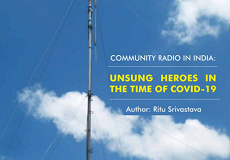
Community radios in India, with their presence in the media landscape for over 15 years, have indeed come of age. Over 300 community radio stations during this period might seem insignificant given the country’s vast population characterised by geographic and cultural diversity, but their contribution to fostering multiple conversations across the national public sphere cannot be underestimated. Despite the rather lethargic movement of the regulatory bureaucracy and continued challenges of financial sustainability, community radios in India have managed to firmly establish an alternative media culture with its diverse ownership structure, Read More

Risk Communication is an exchange of information, advice and opinions in real time between experts or leaders and the community facing a threat (danger) to their survival, health or economic or social well-being (UNICEF, 2020). Community Engagement is a mutual partnership between COVID-19 response team and individuals or communities in affected areas whereby community stakeholders have ownership in controlling the spread of the outbreak (UNICEF, 2020). Read More

‘STEM for Girls’ is an initiative of IBM, supported by QUEST Alliance and DEF is the implementing agency. Both worked together to implement a school-based program which consists of life skills, career, gender, digital literacy and coding skills to encourage secondary school girls to pursue STEM careers. Based on the partner’s requirement they could contribute relevant domain specific training & content to the overall program design and also focus on life skills, career guidance, digital literacy and coding skills, especially to girl students. Read More

We are not surprised that @Facebookapp has changed its name to @Meta and is heading to create Metaverse out of the people of the universe. According to Statista, Facebook has 2.89 billion active users on a monthly basis calculated till the second quarter of 2021. So the idea that Mark Zuckerberg has is that people are enough consumables to offer themselves to create a parallel (Meta)verse even if that is virtual and not as real as a planet in this given Universe. Facebook started to connect people; then they started using them and captured maximum information from each of the users. They captured their locations, movements, activities, faces, gestures, behaviour, thinking, ideas, plans, narratives... Read More

This edition of TypeRight is dedicated to discuss the journey of Community Networks in India, Asia Pacific and around the world. It is also being released at the time of annual event Community Network Xchange (CNX2021), organised by DEF, ISOC, APC, A4AI, APNIC, AIBD & Landscape of Hope. India is grappling with socio-economic exclusion stemming from the uncritical imposition of technology such Aadhar, biometric, and mobile number on marginalised communities. There is enough empirical evidence available in the public domain that shows Aadhar, a 12-digit unique ID card... Read More


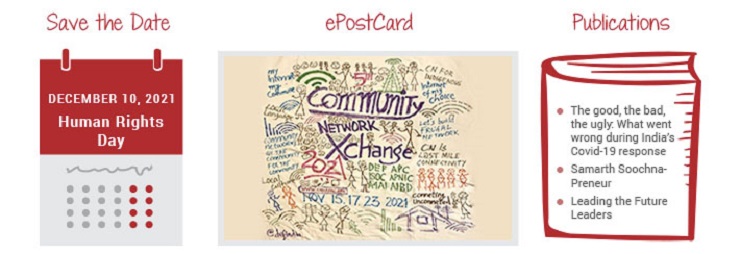



Chouttupal is a one hour drive from Hyderabad on the Hyderabad-Vijayawada highway. Jagdish, Digital Empowerment Foundation’s project officer in Chouttupal had sent me the location of DEF’s centre in Chinna Kondur village near Chouttupal. As I drove on the busy highway I wondered why DEF had opened a centre so close to the city as we are known to be present in remote locations. All my doubts about this centre’s location were assuaged as I turned left from the highway at Chouttupal. The 6 kilometre drive from the highway till Chinna Kondur is through a forest, the one village that comes before Chinna Kondur seemed like a rural village in the heart of a forest. That’s when I realised- in India the remotest location need not be far, they will still be unconnected. Just 60 kilometres from Hyderabad this small village is located in the middle of a forest. Read More
info@defindia.org | def@defindia.net


